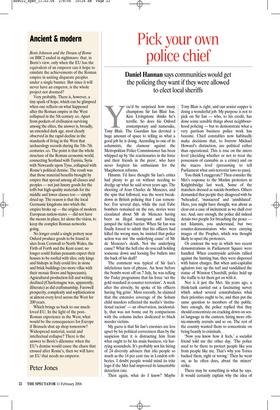Pick your own police chief
Daniel Hannan says communities would get the policing they want if they were allowed to elect local sheriffs You’d be surprised how many champions Sir Ian Blair has. Ken Livingstone thinks he’s terrific. So does his Oxford contemporary and namesake, Tony Blair. The Guardian has devoted a huge amount of space to telling us what a good job he is doing. According to one of its columnists, the clamour against the Metropolitan Police Commissioner has been whipped up by ‘the reactionaries in the force and their friends in the press’, who have never forgiven his enthusiasm for the Macpherson reforms.
Hmmm. I’d have thought Sir Ian’s critics had plenty to go on without needing to dredge up what he said seven years ago. The shooting of Jean Charles de Menezes, and the spin that followed, was the worst breakdown in British policing that I can remember. For several days, while the real Tube bombers remained on the run, stories were circulated about Mr de Menezes having been an illegal immigrant and having jumped the ticket barrier. When Sir Ian was finally forced to admit that his officers had killed the wrong man, he insisted that police action was not ‘the underlying cause’ of Mr de Menezes’s death. Not the underlying cause? What the hell else do you call holding someone down and loosing five bullets into the back of his skull?
The comment was typical of Sir Ian’s infelicitous turn of phrase. An hour before the bombs went off on 7 July, he was telling the Today programme that his force ‘set the gold standard in counter-terrorism’. A week after the atrocity, he spoke of his officers having ‘big grins’. Most recently, he claimed that the extensive coverage of the Soham child murders reflected the media’s ‘institutional racism’ — an observation, incidentally, that was not borne out by comparisons with the column inches dedicated to black murder victims.
My guess is that Sir Ian’s enemies are less upset by his political correctness than by the suspicion that it is distracting him from what ought to be his main business, viz harrying scoundrels. It’s probably not his hiring of 24 diversity advisers that irks people so much as the 14 per cent rise in London robberies. I doubt people would mind its trite logo if the Met had improved its lamentable detection rate.
Then again, what do I know? Maybe Tony Blair is right, and our senior copper is doing a wonderful job. My purpose is not to pick on Sir Ian — who, to his credit, has done some sensible things about neighbourhood policing — but to demonstrate what a very partisan business police work has become. Chief constables now habitually make decisions that, to borrow Michael Howard’s distinction, are political rather than operational. This is true on the micro level (deciding whether or not to treat the possession of cannabis as a crime) and on the macro level (presuming to tell Parliament what anti-terrorist laws to pass).
You think I exaggerate? Then consider the Met’s response to the Muslim protesters in Knightsbridge last week. Some of the marchers dressed as suicide-bombers. Others demanded that people they disagreed with be ‘beheaded’, ‘massacred’ and ‘annihilated’. Here, you might have thought, was about as clear-cut a case of incitement as we shall ever see. And, sure enough, the police did indeed detain two people for breaching the peace not Islamists, you understand, but two counter-demonstrators who were carrying images of the Prophet, which was thought likely to upset the protesters.
Or contrast the way in which two recent demonstrations in Parliament Square were handled. When countryside activists rallied against the hunting ban, they were dispersed with baton charges. But when anti-capitalist agitators tore up the turf and vandalised the statue of Winston Churchill, police held up the traffic to let them get on with it.
Nor is it just the Met. Six years ago, a think-tank carried out a fascinating survey which asked several constabularies what their priorities ought to be, and then put the same question to members of the public. Sure enough, the police replied that they should concentrate on cracking down on sexist language in the canteen, hiring more ethnic-minority recruits and so on. The rest of the country wanted them to concentrate on being beastly to criminals.
‘Now you know how it feels,’ a socialist friend told me the other day. ‘The police used to be there to protect people like you from people like me. That’s why you Tories backed them, right or wrong.’ Then he went on, as he often does, about the miners’ strike.
There may be something in what he says. It would certainly explain why the idea of placing the police under democratic, local control — which was for a long time the preserve of the far Left — has taken off in Conservative circles.
Six months ago, I and a group of localist Tories wrote ‘Direct Democracy’, a manifesto for the radical decentralisation of power in Britain. One of our proposals was that locally elected sheriffs should assume the powers of the police authorities and the Crown Prosecution Service, as well as controlling their budgets. Since then, David Cameron has shown some interest in the notion, and appointed one of our authors, the never sufficiently praised MP for Arundel, Nick Herbert, as his spokesman on police reform.
We don’t yet know what will be in the next Tory manifesto, but the idea of accountable policing could transform the fight against crime and restore honour to our electoral process. Imagine that your local sheriff had to choose whether to spend his budget on a dedicated patrol in your village or on more speed cameras. Imagine that he had to decide what kinds of cases to prosecute whether to go after home-owners who had defended their property with force, for example — and that he then had to stand for re-election on the basis of his record.
Ideally, the sheriff would also be able to set local sentencing guidelines, although not to interfere in individual cases. This may well lead to pluralism (or ‘unfairness’, as opponents will call it). Suppose that the sheriff of Kent wanted shoplifters to serve a custodial sentence, while the sheriff of Surrey didn’t. One of two things might happen. Either Kentish crooks would flood across the county border in such numbers that Surrey would elect a tougher sheriff, or the ratepayers of Kent would get sick of having to fund all the requisite prison places. Sensing his electorate’s mood, the sheriff of Kent might conclude that rehabilitation is cheaper, in the long run, than incarceration. Or he might decree that, instead of going to prison, shoplifters should be made to stand outside Bluewater with placards around their necks saying ‘shoplifter’. I don’t know what would happen. That’s the whole point. It would be up to each community to settle its affairs. But I’ll tell you one thing: people would have an incentive to vote again.
And we should be frank about something else: there will be hard cases. Perfection is not to be had in this world, and there will be inept sheriffs, just as there are inept coppers. It may also be that I have misjudged the mood of my countrymen, and that Blairites (in both senses) will sweep to power everywhere. But at least it would be up to us. We would have rediscovered the principle that decision-makers should be accountable to their communities.
This splendid English notion has thrived in America but withered here, rather like those varieties of grape that survived in California while the phylloxera blight wiped out their ancestral stock in the Old World. It’s time sheriffs came home.















































 Previous page
Previous page